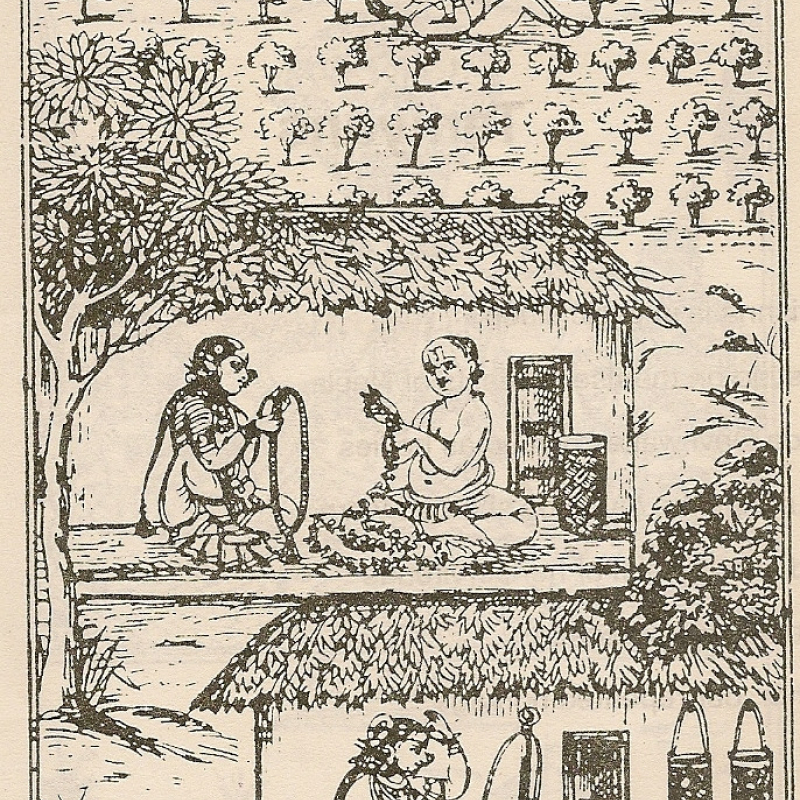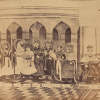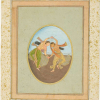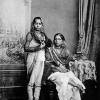The rapture of translating into contemporary English the sacred songs of 8th-century girl mystic Andal is narrated as a passionate enquiry into the unfolding wonders and complexities of an earlier artistic and equally rigorous tradition—that of Sangam (2nd century BCE—4th century CE) Tamil poetics. Plural expression existed down the centuries in the Indian subcontinent that rose from multiple aesthetic traditions being simultaneously practised. The translation of the luminal and the sacred into another tongue, time, tradition and location is the focus of this essay by the award-winning poet, writer and translator.
Andal, the 9th century CE Tamil mystic poet was elevated to the status of a goddess within two centuries of her birth; she was a foundling. She was the only woman among the twelve Vaishnava saints, the Alwars, who ‘dived deep and drowned themselves in the love of god’ implying their complete devotion to Vishnu, often addressed in Tamil as Tirumaal, the ‘Sacred Dark One’. Her legend is that she was caught wearing the god’s sacred garlands, signifying she was his bride, and was severely chastised by her father—also an Alwar—before he realised her divine nature. When she was about sixteen, she merged with her god at his temple in Srirangam, Tamil Nadu. Even today some question her existence, insisting she is a fabulation of her poet-saint father’s imagination as a girl couldn’t have possibly displayed such erudition, erotic longing, mastery of language and poetic imagination embodied in hallowed verse.
Background
The Alwars, along with their counterparts, the Shiva-worshipping Nayanmars, are the earliest proponents of the bhakti movement in medieval India. The movement lays emphasis on God as an entity that is easily accessible to all, celebrates the spirit of personal prayer and stresses on composing devotional hymns in the poets’ mother tongue—as against Brahminic Sanskrit. The movement therefore strikes against the caste system. The bhakti movement became instrumental in the retreat of established and wealthy Buddhist and Jaina sects and, simultaneously, curtailed Brahmin monopoly on religion, even as kings ‘re-converted’ to the Hindu faith.
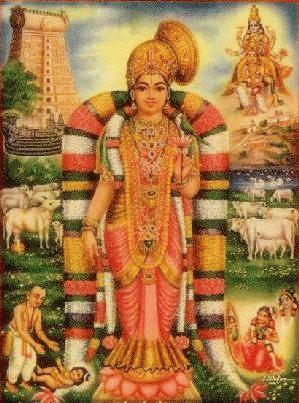
Fig. 1: Andal as represented in present-day calendar art
The Songs
Andal’s first work was composed when she was about thirteen—Tiruppavai/The Path to Krishna, is a lyrical devotional description of vows undertaken by maidens to obtain a good husband; it is a song of congregational worship. In her second and last work, Nachiyar Tirumoli/The Sacred Songs of The Lady[i], Andal sings of her individual need for spiritual and sexual congress with her chosen god and of an abundant female desire explicitly sited in the body, which is sacred in nature.
Notwithstanding its overt sexuality, the Nachiyar Tirumoli and the Tiruppavai are included in the circa 10th-century compilation Naalayiram Divyaprabhandaam (Four Thousand Divine Compositions) that Tamil Vaishnavites consider on par with the Sanskrit Vedas.
My Approach
Most often, in translations of sacred verse, philosophical overtones tend to override the poetry. Being a poet myself, I see her as a poet divine; I’m in her thrall. She composed in Old Tamil, faithful to 2 BCE– 2 CE Sangam-era poetic conventions.
Sangam means a gathering; the practitioners developed rules of composing and interpreting love poetry in which a kind of coded allusiveness was the key. Besides the literal meaning, simultaneous parallel (ullari) and inset (eraichi) meanings needed to be extracted. Such poetry, therefore, offers a riddling generosity of interpretative ograms: view it directly ‘frontally’ and one level of meaning and beauty appears; tilt it to catch another glow, angle it further and different illuminations emerge.
Andal’s is a demanding and generous literary work; it is also emblematic of the profoundly plural resonances implicit in our culture to any act of interpretation.
My first version is closest to her literal utterance.
The second, the parallel, plunges into mythological allusions and her manner of adopting landscapes as metonyms of inner vistas of love and longing.
The third, the inset, is the most liberated. Making this third leap has been the most demanding: this has often been ‘arrived’ at as an inversion of the literal meaning.
Andal.
She tangles in my dreams as a colour unnamable. When I’m awake, she stares from behind my pupils, her sight focussed on hidden stars.
She is fifteen, or has just turned sixteen. Now she’s singing to the rain clouds to carry her missive of passion to the dark and luminous god who lives on the high hills of Vengadam; she sings to Vishnu, The Pervader. Now she’s obedient, following Tamil BCE poetic convention though she lived during the 8th century. It isn’t decorous, her ancient poetic ancestors proclaimed, for a girl in love to speak of her desire to another human being. So she cajoles several inanimate and animate beings—from clouds to birds—to be her messengers. Because her passion is intense they hear her.
We humans, shrouded in details of the everyday, are deaf to the blaze of her call that plumes skywards.
But she’s singing for us.
Monsoon clouds that hood
earth, your rain slashes
the sky, you shake the honey-heavy blossoms
of Vengadam and strew scented petals.
Go tell the dark lord who killed the demon Hiranya
ripping him with paws of fury
that he has robbed me of my bangles.
He must return them to me now!
Andal poses riddles in each verse perhaps because it is the nature of desire to riddle us through and through. Stricken, our bodies turn into maps shafted by voids within which the heavens can be glimpsed. In this way desire makes us large as itself. Though this ache pervades our pores, it is, paradoxically, from its conception, the perception of separation. Desire is solitary as a nucleus knocked off its elliptical path around an atom’s core.
Andal knows its minutiae and vastness: her pulsing heart contains galaxies; her hair stands on edge in anticipation of her beloved. She runs zigzagging through the tulsi garden near her home. In the sloping blue hills on the horizon she sees her beloved’s magnificent shoulders; in the rising sun, his radiant face. She calls through the silence of the surrounding forest—conflating sky with soil, rain with fiery passion, petals with paws of fury. Then she baffles us with a specific image: bangles. Why should a god who kills demons want to rob a girl of her bangles?
What am I to make of this? Or perhaps, what am I trying to remember? Sex: its thrum is an obvious answer but not the complete one.
Andal’s fragrant hair is streaming like the hormones coursing through her adolescent veins when she’s singing these songs in Old Tamil. We, some twelve hundred years later, know them as The Sacred Songs of The Lady. But she remains The Lady whose songs we must not translate for her utterances are too erotic to repeat in other tongues and in other times. Yet each year during the month of maghari (December-January) these hymns are sung and chanted in sonorous Old Tamil as a reverential tapestry of sound.
Could Andal have cared about how she was received? She’s savage and beautiful in her pursuit. Contradictions she does not straddle but swallows whole. And she never is transgressive because she knows no boundaries. She does not care about violating social norms; she violates our very understanding of reality so that we enter the more magnanimous realm of experience she inhabits.
Yet desire awakens her to each twitching stamen that awaits pollination, each bee that staggers out of each lotus; she keens to every trill of the koel bird. At each instance she transmutes every sensory perception into mystical passion. She’s wide-eyed, sharp-tongued and enraged by unfulfilled longing. She celebrates the splendour of the ephemeral world—and the world of her supple arcing body. Sometimes she is lightning, sometimes dripping nectar, sometimes she is a wet petal stuck to soil; at all times she is touch, tick, pulse, the roar of ache.
Bridal mysticism is the term commonly used to define her passion. Implicit in this expression is the concept of a virgin tearing her way towards orgiastic plenitude with a god, an infinitude of holiness. Initially I had imagined this state as a gigantic and continuous wet dream of bliss—a trance of sudden sacred ecstasy. But there is more to this: there’s something violent, almost bestial in its swamping.
I travel beyond the horizon of my imagination to seek Andal, the divine poet who possesses me. And I come to know the words ‘bridal mysticism’ evokes the terror of transformation of the self, a transmuting into an irreversible, unknown state of existence.
In this terrain nothing is excluded—neither pain nor ecstasy. Not even the painful ecstasy of an altered identity that such a love demands. Andal calls Vishnu in his avatar as Narasimha, the roaring man-lion and incensed demon-killer, to heed her. Nothing, however horrific, stops the girl. She wants to hold it all between her two small hands.
Virgin she is but knows sex is the little death when time stands still, when the self hovers momentarily in the thrall of becoming. Andal wants this, and more. Her longing for sacred passion howls. It whittles her in its scream.
I do another rendering of this verse of ‘The Lady’s Sacred Song’, craving to hear her utterance with clarity. The tension and release of sex remains the useful and hoary trope she employs to a different means.
She rends the concept of desire further and further. She simultaneously imprints on rainclouds the suggestion of engorgement of male passion, the physicality of the gathering storm and her fury at being denied unconditional union. In the process I understand the subtle metaphor of the robbed bangles. It’s an aside on the effect of absolute passion.
Dark clouds you enlarge in anger, growl and roll
across the skies rending it open
with lightning bolts; you tear
flowers, spill honey, petals clot like blood on earth.
Go to the fierce lord who plunged his claws in Hiranya roaring
mane tossing as his bloody paws ripped insides out, go
tell him: I’ve grown thin with longing, bangles slip from wrists!
He must heal me with his touch.
Her fury at not being pawed, not being subsumed by unending bliss consumes her. Her blood boils, matching the rage of the leonine god of gory paws. Strewn petals become her menstrual blood scattered futilely on earth.
Andal claims more than the body’s sacrifice: she insists on the body’s glory.
She seeks the profound balm that is birthed in the body’s longing for ecstasy, in erotic splendour—and she pushes this arc.
The touch of the sacred that rips notions of corporality—and with it, notions of time—is the only touch that will heal her. Andal is prey, the prayer and the praying.
Andal is slipping into territories unfathomable as I seek her with a desire and understanding I did not know I possess.
But maybe this always is the way of love and profound desire. The perimeter of the know keeps expanding like desire itself. It consumes the recognisable and cinders the rest of one’s life—and still races ahead as a gale of fire.
In pursuit one becomes blind. Or perhaps the ‘inner eye’ opens.
The more aware I am of her presence, the more immense and terrifying her vision of consuming oneness is; and the more enigmatic she becomes. Andal is the slip of flame that curves beyond the liminal, irradiating the unknown. She is by now racing grace.
Andal is gaining home ground.
Every cell in her body throbs with unfulfilled longing. She claims bliss as her birthright, she is adamant and adamantine; she will not continue to be desire’s quarry. She must capture and char it to be rid of its mauling.
But can Andal outrun desire’s explosion that makes us insuperably hunger for wholeness, this splendid malaise which seems imprinted in our genes?
In mystical passion does Andal confront death—which is the antithesis of the body’s ache?
She knows no fear; only boundless love. Her body—wasted by want but swollen with love— remains her focus for fusing with infinite sacredness. Andal wills this evanescent receptacle, her body, to be the prism through which scorching divine light explodes.
But the child-bride runs in everyday time, through the garden of life, and she wants to run out of it—alive.
But the laws of the universe will not change for a girl. Something has to give.
But Andal is equally implacable: her body and consciousness will merge with the gracious Pervader God who is the bliss of deep time—eternal.
Open armed, fingers extended, her small head thrown back in surrender, her soft blue-black hair streaming starry jasmines, she invokes cosmic splendour to engulf her.
Andal calls the ripping, transforming paws of the sacred to enter her every pore, sense and essence, to atomise her, make the endless love shackled within her body burst into divine, unalterable love. Whatever the cost.
engorged with anger
nails extending he kills
plunging wrists in
these very hands I seek
to gather
my swollen ripeness in
as spilling nectar
my body’s blood flower
bursts
Andal: The Sacred Songs of the Lady/Verse from Song 8/ Dark Rain Clouds Be My Messengers[ii]
8th-century Tamil mystic Andal followed the poetic convention of her time by requesting monsoon clouds to act as messenger to her love, the God of the Universe. However, the same conventions demand intense reader engagement. For, besides the literal meaning, each verse embeds parallel and inset meanings that are left to the reader to discover. Thus, simultaneous shifts in meaning dynamise each verse into a literary trompe l’oeil. The second and third transcreations of each verse embody my understanding of hidden parallel and inset meanings.
(Verse 5 is translated in the essay)
1.
Dark cloud roof unfurling beneath
the roof of the covering sky
Do you herald the coming of my lord Tirumal from high
Venkata hill where bright waterfalls plunge?
My tears, luminous, stream between the full
hills of my breasts
I am not to weep; yet he makes me break my vow:
how does this honour him?
Vast curly vault veiling
the sky’s star drizzled dome
Does your darkness hide
his gleaming darkness from which shimmer
cascades
into my body’s wet valleys?
I weep, forsaking secrecy.
How could my coursing silver illumine his glory?
My love
vast star-filled
overcast
in separation.
Still I flow
a stream lightening–struck
leaping
to lustrate
you
see my glory
2.
Massive clouds you spread to shower
pearls and raindrops on gleaming earth
Bounteous ones, what word do you bring of him, cloud-coloured
whose lives in Vengadam where treetops tousle the sky?
In the dark of midnight, deepened further by your swooping shadow
I flare in love, helpless
Your softest breeze fans my passion: hear me
I could blaze to death
Night hued you are yet you rain brilliance
on earth’s nocturnal rustling wetness
Shed melody: bring me a message
from my dark love large as the cloud-capped mountain
In this black hour of longing, at its center I burn
alone, lost and startled:
A zephyr’s passing murmur makes
me clamour: What news? I’m a single flame doused.
Always magnificence pours
through darkness
as blessing
Yet for me, none. No touch of him
who turns me
incandescent
I am sizzle drizzled
touch untouched
extinguishing
7.
In his avatar as Kurma, submerged tortoise, he supported
the churning of the star–milk ocean awash
with gems. Cosmic treasures bubbled out. Descend
clouds, down to the lotus feet of Vengadam’s lord and lay
there my surrender. Fragrant saffron paste covers
my breasts – that must be wipe
on him; he must embrace
me if only for a day or I waste away.
Splendid the Milky Way spreads spinning
constellations plucked from its depths shimmer
as the great churning begins – before
Time begins. Lotus eyed Nayarana, the Eternal
One caused this to be. Dive deep clouds and lay
me at his crimsoned feet. Tell him of my
surrender; tell him to wash my body’s scarlet longing
for just today else I die.
Churn
churn
Time’s great ocean, each second, each eternity
churn away my adornments
churn my body’s milk
churn me red
from my ocean
churn out my truest self.
Let me rise to you my love or let me die
9.
Great thunderheads that rear as intoxicated elephants
over Vengadam’s forested emerald summit
Ask him who makes his bed on the colossal coils of the sacred
serpent what words he said to me.
He, Protector of All is false
with me, a maiden slender and trusting.
In what light will the world judge him if he betrays
me, tortures me instead? Shouldn’t he protect his name?
Dark thunderheads that clash like rut–mad elephants trumpeting
with trunks entwined over verdant Vengadam’s peak
ask him who sleeps on the serpent’s stupendous loops to awaken
to my distress, to be not twisted
in his words. He, Supreme Guardian guards
me not as he slumbers, head secure beneath the snake’s reared hood.
I blossom in love, a vine yearning to wrap myself on him. What
will universes think him if he lets me die?
:
coiled twisted thunderheads
coiled twisted
words of succor
ask me
tender vine extending
what words of love should be.
save yourself resplendence
by loving me
my love expanding over universes expanding
Notes
[i] Zubaan, New Delhi, 2015; University of Chicago Press, 2016.
[ii] An earlier version of these verses was uploaded on the website Mascara.
Note: An early version of this essay was first published in 'Voyages of the Body and Souls Select Female Icons of India and Beyond', (eds.) Ketu K Katrak and Anita Ratnam, Cambridge Scholars Publishing, UK; a second version in 'Translating Bharat: Reading India', (ed.) Neeta Gupta, Yatra Books, India.
